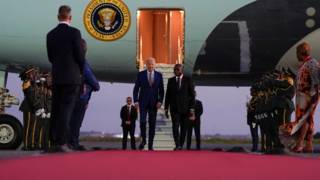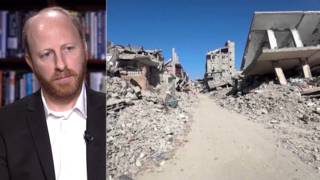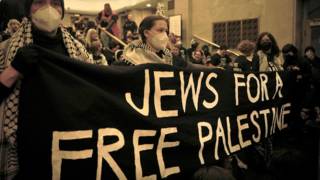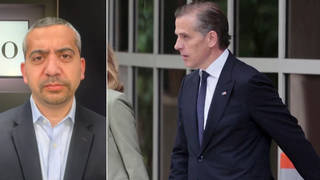
Related
Guests
- Martin Stolarattorney for Shahawar Matin Siraj.
On Monday, 24-year-old Pakistani immigrant Shahawar Matin Siraj was sentenced to 30 years in prison for plotting to bomb the Herald Square subway station in New York City. Attorneys for Siraj said he was set up by a police informant and that the informant was the one who pushed the bombing. Siraj had no explosives, no timetable for an attack and little understanding about explosives. We speak with Siraj’s defense attorney, Martin Stolar. [includes rush transcript]
Transcript
AMY GOODMAN: A high-profile case here in New York is raising questions around police tactics and sting operations in pursuing terror cases. On Monday, a 24-year-old Pakistani immigrant was sentenced to 30 years in prison for plotting to bomb the Herald Square subway station in Manhattan. Shahawar Matin Siraj was arrested days before the Republican National Convention in 2004 and held without bail. This past May, he was convicted on four counts of conspiracy, including the most serious, plotting to bomb a public transportation system.
Attorneys for Siraj say he was entrapped by a paid police informant who cajoled and inflamed him to lure him into the conspiracy and that it was the informant who pushed the bombing. Siraj had no explosives, no timetable for an attack, little understanding about explosives. They also criticize the NYPD’s tactics of sending informers and the undercover detectives into mosques to cast a wide net in search of radical Islamists.
The police department hailed the 30-year sentence, which is the maximum allowed under federal sentencing guidelines. Commissioner Raymond Kelly said the decision, quote, “says that those who conspire against New York will pay a severe price.”
Martin Stolar now joins me in the studio. He’s the lead defense attorney for Matin Siraj. We invited the NYPD on the program, but they declined our request. Welcome to Democracy Now!
MARTIN STOLAR: Good morning, Amy.
AMY GOODMAN: Well, tell us the story. What happened?
MARTIN STOLAR: The story is a fairly simple one, and, unfortunately, it’s a story that has been replicated across the country. We have a paid police confidential informant who was put into the mosque. It was his job. He was to go to the mosque, one on Staten Island, one in Bay Ridge, and on his way to the mosque, he stopped in a bookstore that was next to the mosque, which is where Matin, which is what he’s known by, worked for his uncle, in a bookstore called Islamic Books and Tapes. And he started befriending Matin. He was twice his age. Matin was somebody who came from an Ismaili sect of Islam, a rather secular sect, which is viewed in Pakistan as basically not being Islamic. That led to the family leaving, because the father and his stores were burned and he was beaten. So the family left.
They came to the U.S., and then Matin runs into this fellow, Eldawoody, who says, “I’m an Islamic scholar. I’m twice your age. Let me teach you about what the duty of somebody who’s really an Islamic person is.” And he begins to befriend him. And as the war in Iraq starts to ramp up, and as the pictures of Abu Ghraib come out, this guy starts to twist this young man. He’s now just 22 years old. He’s been in the U.S. since 1999, and he convinces him that it is the duty of somebody who is a true believer to engage in violent jihad — that is, to cause great economic harm to the United States. And he twists him and convinces him that it’s his duty to do this.
As a result, the young man says, “Oh. Let’s blow up this 34th Street subway station.” And the confidential informant, who is pretending to be somebody who is connected with the Brothers, the Brotherhood, induces the young man to agree to this kind of a plot, and so they discuss it. At some point, he starts taping him. But totally after he has twisted his mind and convinced him that it is his duty as a true believer to carry out some kind of violent jihad. So the plot to blow up the 34th Street subway station develops as a result of the confidential informant, who has been in the community and at the mosque for about two-and-a-half years, doing nothing except reporting on what people say, reporting on what sermons are being delivered at the mosque, and basically coming up with nothing, until he develop this young man as somebody who’s willing to engage in violent conduct.
The plot then, as it’s recorded over the — by an electronic device, is such that the confidential informant is the one who’s supposed to supply the explosives. The confidential informant is the one who supplies the backpacks that the explosives are supposed to be kept into. And at the last minute, the young man says, “Wait a minute. I don’t really want to do this. I don’t want anybody to get killed. I don’t want to be the one that’s involved in placing a bomb any place. I think I better check with my mother before I go any further with this plot.”
Five days later, he’s arrested. And something that began with the New York City Police Department putting a confidential informant into the community and putting him directly at the mosque turns out to be a federal prosecution. And they took it federal, because they could get a much longer sentence. So now, this young man becomes the symbol of terrorism in the United States. In essence, what we have is the New York City Police Department creating a crime so they can solve the crime and claim a victory in the war on terror. That is not the way to investigate terrorism, as far as I’m concerned.
AMY GOODMAN: Is he recorded on tape saying, “I don’t want to do this. I’m going to talk to my mother”?
MARTIN STOLAR: Oh, yes. He’s recorded on videotape, saying, “Wait. I better not do this. I have to check with my parents to see if I really want to go forward with this.”
AMY GOODMAN: This police informant went to some —- what, more than 570 times went to the mosque in Staten Island, as well as Bay Ridge, prayer services there -—
MARTIN STOLAR: Yes, that’s right. He went to prayer services —
AMY GOODMAN: — filing reports daily.
MARTIN STOLAR: Filing reports daily, four or five times a day, when he [inaudible] prayers.
AMY GOODMAN: Hundreds of them.
MARTIN STOLAR: Five times a day. And when he was at the mosque, he would stop next door at the bookstore, talk to Matin and then developed enough of a friendship with him, or at least a purported friendship, that he kept driving him home between the Bay Ridge mosque and the bookstore in Brooklyn and his home in Queens, so that they’ve had a lot of time to have discussions.
AMY GOODMAN: Showing him photos of Abu Ghraib?
MARTIN STOLAR: Showing him photos of Abu Ghraib, discussing with him what his duty was as a true believer, and convincing him that some sort of violent conduct to rock the American economy would result in the troops being brought home from Iraq.
AMY GOODMAN: Did he give him explosives?
MARTIN STOLAR: No explosives were ever given to anybody. The plot had no chance of succeeding, because the plan was that the explosives would be provided by the confidential informant. And don’t think for a minute that the police, through their confidential informant, would have given him explosives. What they gave him were backpacks so that he could show to Matin and another young confused man named James Elshafay, here’s what we’re going to do, here’s how we’re going to carry out the plot.
AMY GOODMAN: And what happened to Elshafay?
MARTIN STOLAR: Elshafay ultimately was also arrested, but agreed to cooperate with the prosecution and testified as a witness at Matin’s trial. Matin put on an entrapment defense, and it was a legitimate entrapment defense. It was unfortunately rejected by the jury, and that has a lot to do with the political climate. If you’re a Muslim accused of terrorism, then a jury is very, very hardbound not to convict you.
AMY GOODMAN: Were you surprised by the sentence?
MARTIN STOLAR: I was surprised by the sentence. It’s extraordinarily harsh — in fact, I would say draconian. This is a young man who is not terribly bright, who was easily manipulated into being somebody who agreed to go along with somebody who he thought was an Islamic scholar. And you just don’t sentence somebody who has got no prior record, is not terribly bright, is easily manipulated, has done nothing except work since he came to the United States.
And the penalogical purpose of sentencing somebody to 30 years is what? To — you know, essentially what we’ve had is we’ve had a symbol of terrorism sentenced. A 30-year sentence is ridiculous, especially when you compare it to a sentence that was handed down the same day in Germany to somebody who was a confederate of the 9/11 bombers, who was sentenced basically for his role in mass murder, sentenced to 15 years in jail. And here is this young man in the U.S., who was manipulated and set up to be involved in a bombing conspiracy that never had a chance to go any place, to 30 years. What kind of message does that send?
AMY GOODMAN: So the sentence comes down Monday. Tuesday, Siraj’s mother, father, and 19-year-old sister are detained — yesterday?
MARTIN STOLAR: Yes, unfortunately. I mean, what a remarkable coincidence that the day after their son is sentenced to 30 years, the parents and the sister are picked up by the immigration authorities.
AMY GOODMAN: Now, they have been applying for asylum here?
MARTIN STOLAR: The father and the mother and the sister all have an appeal pending on a claim of political asylum.
AMY GOODMAN: From Pakistan.
MARTIN STOLAR: From Pakistan. You remember I told you they were Ismaili and a sect of Islam, which is viewed politically as not really being Islamic in the neighborhood in Pakistan where they grew up. So that was the political asylum claim. It was rejected by immigration initially at their hearing, and now it’s been on appeal to the Second Circuit Court of Appeals down here in Manhattan, and nothing changed. You know? They’ve been out. They’ve been free. They’ve not run away. They haven’t done anything.
AMY GOODMAN: Have they been at the trial? Had they been?
MARTIN STOLAR: Yes. They were at the trial. His father was at the trial almost every day. The sister came every once in a while. And his mother came and testified as a witness at the trial about her son’s good disposition, that he was not somebody who was an evil person. What the government has done by painting this young man, who is really not very bright, as the mastermind behind the plot to bomb the 34th Street subway is really creating a devil so that they can lock up the devil. It’s just not the way to fight the war on terror, to the extent that there is a war.
AMY GOODMAN: And this wide net that has been cast, the practice of sending in undercover officers into mosques?
MARTIN STOLAR: Well, not only did they have this confidential informant in the mosque, but at the same time there was an undercover police officer, whose name we only know as “Kamil Pasha,” who about two years before these events took place was placed directly into that community. He was taken out of the police academy after three or four weeks in the police academy, told, “You go undercover into the Bay Ridge community, and we’ll make you a gold-shield detective, if you do it for a couple years for us.” And sure enough, he went out, totally without any kind of brief, without any kind of training, to go into the community and listen for what he could hear.
So, he testified ultimately at the trial that when he heard Matin talk about the fact that Matin thought that he could understand why Palestinians might use suicide bombing, because they have no other means of making their point, as a political statement, he thought this was the most radical thing he had ever heard. He couldn’t — like he had never heard of Palestinian suicide bombings before he met Matin, who said something about it. Now, these are common political discussions that go on in the community, and this guy was reporting back political statements that people were making, statements by Matin, for example, that said, “Look, if the U.S. invades Iraq, I bet there’s going to be another act of terrorism.” That’s not something that says, “I want to engage in terrorism.” That’s making a political statement that says this is going to happen.
AMY GOODMAN: Martin Stolar, I want to thank you very much for being with us. We will continue to follow this case and the case of Siraj’s mother, father and sister. Thank you.
MARTIN STOLAR: Thank you, Amy.
AMY GOODMAN: Martin Stolar, attorney for Shahawar Matin Siraj, sentenced this week to 30 years in prison. His family has now been detained.












Media Options